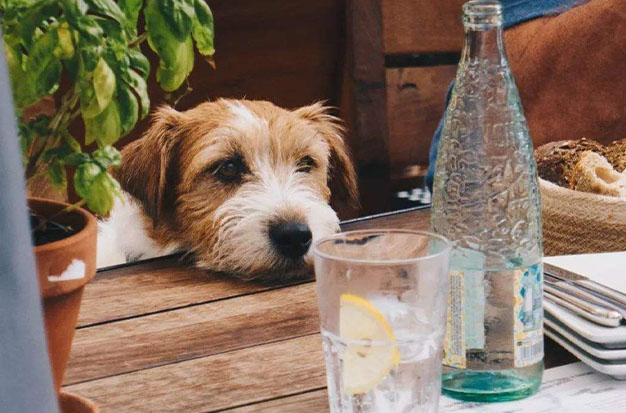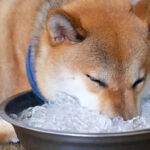Have you ever had a warm day that was made bearable by a glass of ice water? Everybody has been there. How about adding ice to the water for dogs instead?
It’s a straight line of thought. On a hot, sunny day with your dog panting, how about adding some ice to the water for dogs?
Certainly a straightforward notion, but dogs and ice water? Dealing with it in a straightforward yes or no way is difficult. There are health implications and precautions that are necessary to recognize prior to action (which 100% applies to anything and everything you introduce to your dog!).
Don’t worry! We’ll tackle the concept of ‘dog and ice water’ with general introductions, health warnings, dangers and precautions, and the right way to do it.
Does Ice Water Harm Dogs?
Unquestionably, hydration depends primarily on water.
Although there are times when the stress of the activity and the weather makes water seem insufficient. And that’s where the seductive thought, “Can I give my dog cold water?” comes from.” comes in.
In particular, Dr. DiFazio of the Veterinary Emergency and Referral Group in New York City states that “Cubes are useful as a means to ensure water ingestion” and “Pets can slow the rate at which they drink water.” Hydration may take the form of a solid or a liquid.”
Ice cubes do have advantages, but they also have disadvantages, just like everything else.
I’ll go around again: can dogs drink ice-cold water? The short answer is yes, but there are a few things to watch out for and things that could happen. Furthermore, it is vital to recognize the right way in giving dogs ice water.
Should Dogs Drink Warm Or Cold Water?
However, compared to other dogs, the dogs with the lowest core body temperatures were more likely to choose warm water to drink (Figure 2). The findings of this study demonstrate that dogs are selective in their selection of drinking water and, like people, prefer to drink cool water.
What Water Temperature Is Ideal For Dogs To Drink?
Some dogs react poorly to ice, so use caution when feeding it to your dog. Water should always be at room temperature for animals, but if it was a little colder than usual, it wouldn’t harm them.
What Is Bloat?
Let’s start with the alleged root of the issue. Bloat is a part of the myth’s reality. It happens when a dog gorges on food or liquid that also suffocates the animal’s digestive tract with a lot of air. The stomach enlarges, as the name suggests, as it has been adapted to do when an organism eats. This response has the unfortunate outcome of causing abdominal pain. Every Thanksgiving, you presumably go through the same thing.
Your puppy’s stomach isn’t the only area of discomfort. The pain is made worse by the pressure on the nearby organs. If your dog’s stomach starts to twist in response, trouble has begun. It then turns deadly, possibly.
What Is Gastric Volvulus And Dilatation (GDV)?
Gastric dilatation and volvulus may result from the situation getting worse. The organ moves out of position and collapses in on itself. It resembles what happens when your garden hose twists. While limiting the flow of water, the pressure increases even more. In this instance, the stomach and other organs are being supplied with blood.
The stomach’s components may die if there is inadequate blood flow. Without a doubt, it poses a risk to life. The only treatment option is urgent surgery. This means that in order to take the proper action, you must identify the symptoms as soon as possible. The condition of a pet like this is not concealed. It’s just too painful. He might bite you, especially if you reach for his belly. He’ll display apparent signs of distress.
There is no denying that your dog is seriously ill.
Some breeds are more prone to it than others, especially if your dog has a broad chest like a Great Dane. Their body type limits their stomach’s ability to expand, which raises their risk of developing GDV.
The best action you can take is to stop your pet from overeating. For him to avoid guzzling a lot of water after play, it is necessary to keep him hydrated. To avoid your dog being ravenous when it’s time to eat, you’ll also need to schedule his meals to be spread out throughout the day. He’ll be less likely to swallow a lot of air as he eats, which can stop his stomach from expanding.
The takeaway message regarding cold water is that it isn’t the temperature that is encouraging your pooch to drink a lot. While he is active, there isn’t a consistent supply, so that is the problem. The idea that drinking ice water will make you bloat and have serious health repercussions probably originated from this.
The time when you had to clean up water messes after your pet drank is long gone. With our Hepper Nom Nom Bowl, you’ll never have to worry about water spills again.
A large tray contains two stainless steel bowls that are positioned inside of it to catch every last drop that drips from your pet’s mouth. Even though they might not be the cleanest drinkers, your pet is no longer required to be! Click here to purchase your own and say goodbye to water spills for good.
Does Ice or Cold Water Cause GDV in Dogs?
No, drinking ice or cold water does not in and of itself make you bloated. The dog may bloat, though, if they consume the water or ice too quickly because they are swallowing a lot of air.
When a dog is sweaty from exercise or because the weather is hot, ice or ice water is typically given to him. The dog might quickly consume the ice or water in those circumstances. The temperature of the water provided might appear to be the problem if GDV occurs, but this is untrue.

Can I Give My Dog Ice Or Cold Water?
Yes, but make sure he takes his time with it. Giving him frequent small amounts rather than a large amount all at once may be the solution.
Keep your dog calm for an hour or two if he consumes large quantities of food or water quickly. The chances of an air-filled stomach flipping over and twisting off increase if you let him run, jump, and play afterward.
In general, it’s a good habit to develop to allow your dog to rest after meals and beverages, especially if he is a deep-chested breed or one that is more susceptible to GDV, like:
- German shepherd
- Great Dane
- Doberman pinscher
- Saint Bernard
- Standard poodle
- Irish setter
- Bouvier
- Wolfhound
- Old English sheepdog
- Akita
- Mastiff
Conclusion
“Are dogs able to drink ice water?” let’s break it down.
It’s safe to say that “good” isn’t always the best term. To place it bluntly, yes, you can put ice into your dog’s water and there are safer ways to do so. However, it’s best if you don’t.
Giving them cold water on a hot summer day is the least dangerous approach. However, it’s vital to stick to small amounts in order to prevent GDV or bloating. Additionally, if they drank a lot of water, keep them still for the next hour to reduce the chance that their stomach would flip.
You and your animal companion are good to go as long as you keep these tips in mind.


